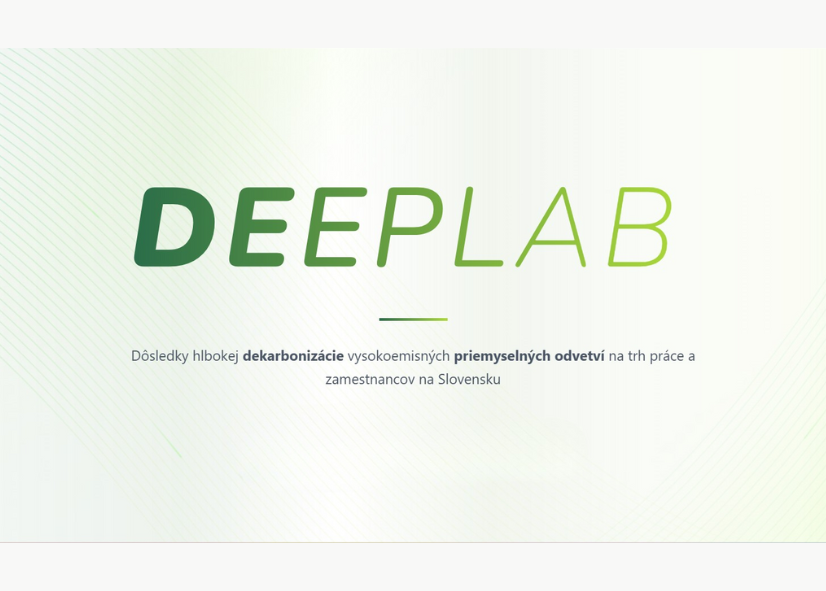Jan. 20, 2026
RESEARCH PRESENTATION AND DISCUSSION: Decarbonisation of Slovakia’s Energy Sector and Employment

63
2024 - 2026
The DEEPLAB project responds to the topic of economic and labour market consequences of climate change in terms of mapping consequences to the Slovak industry, especially in hard-to-abate industries and its supply chains.
Project number:
09I03-03-V04-00768
Supported by European Union NextGenerationEU via National Resilience and Recovery Fund

The DEEPLAB project responds first and foremost to the topic of economic and labour market consequences of climate change, especially in terms of mapping consequences to the Slovak industry, especially in hard-to-abate industries and its supply chains.
The project aims to widen the knowledge distinguishing the future demand for different qualification levels of employees in hard-to-abate and emerging sectors tackled by decarbonization, thus offering detail view on the future labour market developments in the Slovak industry under different pathways of deep decarbonization.
The project, supported by the Slovak National Resilience and Recovery Fund, emphasizes the critical need for stakeholder cooperation in developing a strategy to mitigate the impacts of labor market changes in alignment with just transition principles. To achieve this, researchers implement an input-output model to capture the impacts of technological changes in economic sectors affected by decarbonisation and combine it with stakeholder consultations.
The intended study combines qunatitative modelling of input-output analysis with qualitative stakeholders engagement.
The main research questions of the project are: What are the consequences of the decarbonization on labour market under different scenarios of technologies implementation? What is the impact of the stakeholders' involvement in the quantitative modelling and what policies can be derived from the modelled scenarios?
In order to answer these questions, the project has five objectives:
1. Mapping the scale and scope of decarbonization across the Slovak industries
Through data analysis and desk research, we identify industries most CO2 and employment intensive and we seek for the ways of their probable decarbonization pathways in the academic literature. Identification of technologies relevant for decarbonisation of the selected sectors will build on the existing available studies (Bataille et al., 2018; Napp et al., 2014; Wesseling et al., 2017). We provide a one pager summary for stakeholders and we also prepare data for modelling (capital intensities for different decarbonization pathways).
2. Collecting inputs on considered deep decarbonization pathways with industry actors and labour policy representatives
The purpose of this objective is to discuss the current state of the art of the implementation of decarbonization technologies and the mid-term and long-term expectations, with relevant stakeholders and implications for the labour market. This will be conducted in the form of interviews with stakeholders. Following the iterative approach of the Deep Decarbonization Pathways framework, inputs from the discussion can partially correct the inputs into the suggested structural IMPACTECH model for Slovakia.
3. Model the decarbonisation of selected sectors by 2030, 2040 and 2050 using at least three different scenarios assessed through an adapted multi-regional structural model IMPACTECH
This will lead to modelling of the decarbonisation of selected sectors by 2030 and 2050 using at least three different scenarios assessed through an adapted multi-regional structural model IMPACTECH. Standardized dashboard reporting is used to present results to the stakeholders to inform further discussion about possible pathways focused on labour market policies.
4. Share the results with the scientific community
Throughout the whole project, researchers will outreach scientific community to present and discuss the methodology and results of the proposed project. Two academic articles are planned reflecting the innovative approach to combine qualitative and quantitative research methods and presenting results. Attendance at conferences and academic discussions is planned as well.
5. Share the results with stakeholders and provide salient evidence and through co-creative workshops provide recommendations for policy-making.
We present and discuss our results with the stakeholders to inform their discussion about the possible pathways for labour market policies. For this purpose three co-creative workshops focused on three selected sectors are organized. The result will be shared with policymakers and wider public.
Oficial project website: https://deeplab.celsi.sk/en/
Project events
Jan. 20, 2026
RESEARCH PRESENTATION AND DISCUSSION: Decarbonisation of Slovakia’s Energy Sector and Employment
Sept. 17, 2025
CELSI at SEAM 2025: Labour Markets, Gender, and the Green Transition in Focus
June 20, 2025
CELSI Frontiers Seminar: Modelling Slovakia’s Green Future with DEEPLAB
June 13, 2025
June 13, 2025
Climate change and how it affect workers
June 5, 2025
CELSI researchers presented on the decarbonization of Slovakia at an economic conference in Venice
April 17, 2025
CELSI researchers contributed to the discussion among Central European unionists on a fair green transition in Vienna
March 28, 2025
CELSI researcher Jakub Barszcz presented on the decarbonization of Slovak high-emission industries in Groningen, the Netherlands
March 13, 2025
CELSI organised the meeting with the employers´association in renewable energy sector - SAPI and unionist from KOZ SR
Dec. 6, 2024
CELSI Frontiers Seminar: DEEPLAB project introduction
Project partners: